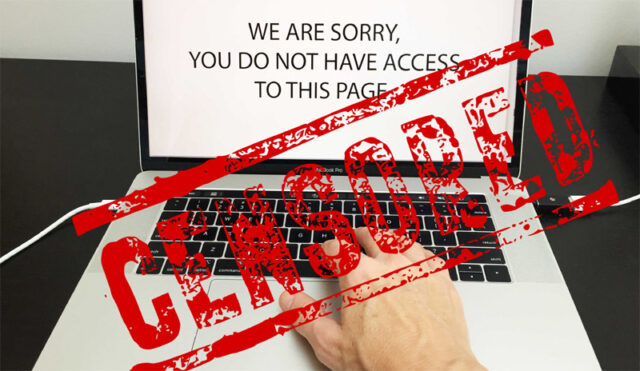The Principal’s Office (or: “Dabid vs. Net Nanny”)
Attending prom wasn’t the only unforeseen event that occurred because of my being part of the newspaper staff during my senior year of high school. For the one and only time in my public schooling career, I got called into the principal’s office.
For this school year, a “web-nanny” software had been installed on the school computers to keep students in the computer labs from going to websites with objectionable content not suitable for minors (stuff like pornography and… well, I don’t really know what else, but apparently porn is a big concern with high schoolers). It also blocked what I considered to be perfectly acceptable websites about video games and action figures, which raised my ire as needless censorship.

And so, as my justice-loving self, I decided to write up an editorial for the school paper decrying the content-control software as being unnecessary censorship. I don’t think anyone had said I was “cool” since I was briefly super-popular as a Freshman, but I did get some props on that article from classmates who wouldn’t normally engage me.
Some time after my article was published, during one of my morning computer lab classes my classmates discovered mysterious, thin scraps of paper on the floor. Each of them had a URL written upon it—a URL that when entered into the school web browsers, would allow the control software to be bypassed so that students could visit wherever they wanted on the internet.
My righteous teenage brain saw this as justice prevailing through some sort of divine intervention, so I immediately and enthusiastically went and told one of my newspaper staff mates about it and gave her one of the papers. She, in turn, told other students about the bypass method, who came to me asking how to utilize it. Within an hour or so, every student in the school computer labs was happily bypassing the content-controls. And shortly thereafter that, there was a teacher tapping my shoulder and escorting me down to the administrative office.
As an adult, I can look back and see how this must have looked to the school administration: a senior student who had publicly denounced the school ‘s Internet content-control system caught distributing information to potentially hundreds of other students on how to circumvent that software. In retrospect, this seems like an open-and-shut case and a suspension.
In actuality, I had a brief and honest chat with the assistant principal, where I explained that I had simply found the papers with the workaround for the filtering system randomly on the floor during a class, and that I saw no issues with distributing it to other students as there weren’t any school rules prohibiting sharing website URLs. I wouldn’t know what “Lawful Good” was another two decades, but I was definitely exhibiting it here, working within the boundaries of the school rules toward a result that I was dead certain was good and just.
The assistant principal cited my editorial and tried to convince me that despite my optimism and good intentions, some of my fellow students might try to visit harmful or inappropriate websites. But I stood firm with my simple argument: that I didn’t believe they would do such a thing (which I whole-heartedly believed to be the truth).
I’m legitimately not sure the assistant principal knew what to do with my (delusional) genuineness, because I was dismissed in a sort of agree-to-disagree fashion with no punishment, teachers were alerted to be on the lookout for students using the censorship bypass, and the issue was never brought up to me again. And so ended my only public schooling run-in with The Man.

I spent too much time in the Principal’s office for openly disagreeing with or flat out correcting a Teacher’s mistakes… Highschool was a very interesting time for me